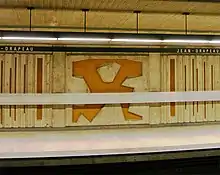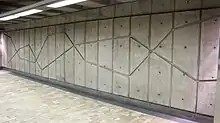Jean Dumontier
Jean Dumontier (23 June 1935 – 27 December 2018) was a Canadian-Quebecois architect and artist. He is best known for having designed the Montreal Metro stations Jean-Drapeau (serving the Expo 67 site) and Longueuil-Université-de-Sherbrooke. He was also the first architect of the subway to have himself created the works of art for the stations of his own design, those being the four concrete walls of the dock of the station Jean-Drapeau.[1]
Jean Dumontier | |
|---|---|
| Born | 23 June 1935 Rigaud |
| Died | 27 December 2018 |
| Occupation | Architect, artist |
| Works | Jean-Drapeau station, Longueuil station |
Biography


Born in Rigaud in 1935,[2] Jean Dumontier was hired by the city of Montreal in the 1960s, joining the team of architects who developed the Montreal Metro in 1962.[3] He was entrusted with the design of stations that would serve Expo 67, Île-Sainte-Hélène and Longueuil (today Jean-Drapeau and Longueuil-Université-de-Sherbrooke).[4] He also created the murals of the Jean-Drapeau station, representing the Titan Atlas and recalling the theme of Expo 67, "Man and His World" (Terre des Hommes).[5]
In 1967, at the age of 32, he became head of the metro design office and hired young architects of his generation.[6] In the 1970s, he was appointed Superintendent of the Architecture Division at the Metropolitan Transportation Bureau (BTM),[7] then became its director, overseeing the extension of the network in the 1970s and 1980s.[8]
Throughout his career, he promoted the integration of works of art into the architecture of all stations, which makes the Montreal metro unique in the world.[8][9] Several noted artists, such as Jean-Paul Mousseau, Michel de Broin, Marcelle Ferron, Charles Daudelin and Frédéric Bach, are represented by significant works in the Montreal underground.[10]
Many cities around the world approached Dumontier to build, extend or modernize their transit system.[11] Cities like Mexico City, Boston, New York City, Los Angeles, Washington D.C. and Atlanta have been inspired by the Montreal network in their own drives for redevelopment.[12]
Jean Dumontier died of cancer on 27 December 2018, at the age of 83.[1]
See also
References
- "Jean Dumontier, architect of Montreal métro stations, dead at 83". The Gazette. Montreal. Retrieved 30 December 2018.
- Church Records and Vital Statistics of Quebec (Drouin Collection), 1621 to 1968, ancestry.ca. Retrieved 8 January 2019.
- Pinard, Guy (8 October 1991). "Le métro, c'est aussi une galerie d'art" [The subway is also an art gallery]. La Presse (in French). p. 6. ISSN 0317-9249. Retrieved 30 December 2018.
As a simple architect first employed by the Architects Office of the City of Montreal, and then as Chief Architect of the Metropolitan Transportation Bureau, he has been involved in the Montreal metro since 1962, so from the very beginning. almost.
- Paré, Isabelle (8 October 2016). "Un maire, un visionnaire et un réseau" [A mayor, a visionary and a network]. Le Devoir (in French). Retrieved 30 December 2018.
Young architects, like Jean Dumontier, will get their hands dirty. Île Sainte-Hélène, Expo 67's flagship resort, has rest rooms and toilets – now missing – to accommodate masses of visitors.
- "Jean-Drapeau (Jean Dumontier)". Société de transport de Montréal. Retrieved 30 December 2018.
- Provost, Anne-Marie (14 October 2016). "50 ans du métro de Montréal : du chantier à la réalité" [50 years of the Montreal subway: from construction to reality] (in French). CBC/Radio-Canada.
Jean Dumontier was only 32 years old when he became head of the Metro's office of architect. Before his promotion, he himself designed two stations in Longueuil and on Île Sainte-Hélène.
- Minutes of the meeting of the Executive Committee of the Communauté urbaine de Montréal, Archives of the City of Montreal, 7 January 1975
- "Jean Dumontier, architect and artist of Montreal subway stations, dies". Global News. 30 December 2018. Retrieved 30 December 2018.
- Magder, Jason (8 November 2018). "The métro at 50: Building the network". The Gazette. Montreal. Retrieved 30 December 2018.
- "L'art et l'esthétique au cœur du métro de Montréal" [Art and aesthetics at the heart of the Montreal metro] (in French). CBC/Radio-Canada.
Since the design of the metro, artists have been involved to beautify the stations. Several big names have left magnificent works in the basement of Montreal, such as Jean-Paul Mousseau, Marcelle Ferron and Frédéric Bach. In addition, the design of the wagons and the stations was also done with the greatest care by architects and designers having at heart to create one of the most beautiful metros of the world.
- Girard, Joëlle (30 December 2018). "Jean Dumontier, l'un des architectes du métro de Montréal, s'est éteint" [Jean Dumontier, one of the architects of the Montreal metro, died] (in French). CBC/Radio-Canada. Retrieved 30 December 2018.
Jean Dumontier has also moved from Seoul to New York to advise the teams responsible for building, extending or modernizing their own network.
- "Jean Dumontier, architecte du métro" [Jean Dumontier, metro architect]. La revue des membres de l'ordre des architectes du Québec (The magazine of the members of the Quebec Order of Architects) (in French). September 1981. Retrieved 30 December 2018.
Mexico City is a typical example of the application and development of the Montreal concept. Montreal has also influenced the redevelopment of the Boston network, the oldest on the North American continent. New York has studied the characteristics of the Montreal network and has been inspired by the redevelopment of certain stations, for example, in the case of the redevelopment of access to the World Trade Center. BTM experts are frequently consulted. I was recently invited to Los Angeles. For their part, Washington and Atlanta have also studied the Montreal network.